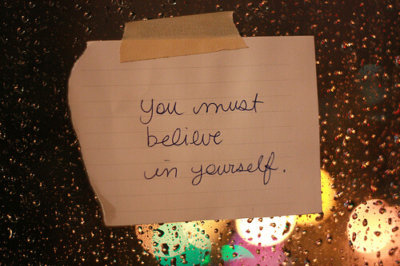11 Tools For Building Confidence – Starting Today
by Andrea M. Darcy
It seems that in today’s modern world, confidence is a currency similar to money. We all want more of it, and it never seems enough.
But building confidence is something that can be done by anyone, it just requires commitment. And the right tactics over the myths spouted all over the internet.
The myth about building confidence
The self-help movement has connected confidence with success. This concept is actually a myth — more on that later. You don’t have to be successful to be confident.
It’s also possible many of us actually have an inflated idea of what confidence feels like. We expect to one day never feel any anxiety at all.
But our brains are primal, wired to trigger anxiety and fear sensations if they sense danger. Of course nowadays “danger” comes less in the form of a wild animal, and more in the form of a job interview or first date.
This means that no matter how confident you want to feel, to some extent every new situation in life will see your adrenaline rise and your heart pound. This doesn’t mean you lack confidence. It’s important to not let a feeling of fear stop you, but to create confidence by feeling the fear and taking action anyway.
11 Tools for building confidence
Use these tools and tactics to make you as confident as you naturally can be – or to actually discover how confident you already are.
1. Switch your perspective.
It’s all too easy to focus on what is wrong and where you need to improve things, while entirely overlooking the places you actually already live fearlessly.
Try a new perspective. Imagine that you were an alien watching yourself from above. Would you not notice that despite the fact that you can’t do public speaking, you drive without a thought, easily talk to colleagues, and run 10 k without a thought?
Before you scoff that those things don’t count, note that for other people these things inspire terror and sleepless nights.
2. Jump into the present.

By: Chris Wilpert
Insecurities live in two places – the future and the past. We worry about what will possibly go wrong and then convince ourselves the past will repeat itself. Just because the last work presentation went wrong we are sure the upcoming one will, too.
What would happen if you worked to notice how you are doing and feeling right here and now?
Mindfulness is a great practice for making this an ongoing habit.
3. Stop spying on other people.
If you compare yourself to those you perceive as beneath you, it might make you feel temporarily better.
The trouble is that when it comes to social media, the stomping grounds for many an inner ‘spy’, we often go the other way. We end up comparing ourselves to people we perceive as above us. Even if we know that Facebook and Twitter generally show a very one-sided view of people (the good side), the result is inevitably that we feel down on ourselves.
And while it might seem smart to research all the other candidates for a job you are up for, ask yourself first, what will this give me? Will this really help my interview?
(For more on the dangers of social comparison when it comes to building confidence, read our article on Comparing Yourself to Others).
4. Surround yourself with the right people.
If the people in your life often criticise you or push you to do and be more, ask yourself, what it would be like if I surrounded myself with people who believed in me?
Of course to some extent this has to start with you, but a few positive minded friends can’t hurt. Nor can a mentor, coach, or counsellor.

By: Alan Cleaver
5. Stop waiting for the fear to go away.
An false idea many have that there is a tribe of people out there who have confidence all the time, and never feel fear. Unless someone suffers from a personality disorder, they will feel fear. Our fear is really a primal reaction we can’t get rid of.
Most people who are attempting their dreams in life will happily tell you that the fear doesn’t go away. If anything, it gets stronger. The only difference is that they have developed tactics to take action in spite of the fear.
6. Stop confusing confidence with comfort zone.
If you decide you have no confidence and better give up every time you get a clench in your stomach or start to sweat? It might be that you are confusing lack of confidence with your normal bodily response to trying something outside your comfort zone.
The next time this happens, instead of panicking and quitting, try to take two more steps toward your goal despite the nervous feelings. Do you suddenly feel confident anyway?
7. Beat your body with big breaths.
The ‘fight or flight’ response which can make us feel under confident happens because stress sets off the sympathetic nervous system. This gives the body a burst of energy and a cocktail of chemicals that help us be alert.
What can counteract that? Breathing deeply, it seems. By taking measured, full, and long breaths in and out of your diaphragm, you can then call into play the counteractive and calming parasympathetic system. This slows down your heart rate and lowering your blood pressure.
8. Get clear when building confidence.
It’s easy to moan, “I need to be more confident!”. But this can become an addictive habit of beating yourself up that will never change unless you decide exactly how you want to be confident. And the steps you can take to get there. Treat building confidence like any other goal. Make it SMART – specific, measurable, attainable, realistic, and with a time frame.
9. Stop being a storyteller.
Sometimes it’s not that you’re not confident. It’s that you are addicted to telling your story about having no confidence. Like any sort of victim story, it garners attention. And that can be something you can come to rely on without realising it.
Try not talking about your lack of confidence for an entire week. If you do slip into a story about your insecurities, just notice it instead of beating yourself up. The very act of becoming conscious of the habit can itself do wonders.
10. Do more of what you ARE confident at.
Sounds silly, but this can be remarkably affective. If you have to give a speech at your friend’s wedding and are terrified, schedule in as many things around the event that you know you are good at to raise your endorphin levels and your self assuredness.
11. Try an improv class.
You don’t have to be an actor to benefit from improv. Many corporations now run such events for employees, recognising the value of improvisation for training people to get out of their head and into the now, trusting the moment to unfold as it will.
So what if you still feel under confident?
Remember the mention earlier that confidence wasn’t actually necessary to be successful?
It turns out it’s not perfectly possible to have a great life and career with faltering confidence. When the American Psychological Society commissioned a team in 2000 to assess research on esteem and confidence, the results were a surprise.
A team of top researchers showed that confidence wasn’t the key ingredient of a good career at all, but that humility made for better leaders than high self-esteem. One of the professors involved, Roy F. Baumeister, is quoted as saying –
“In fact after all these years, I’m sorry to say, my recommendation is this… concentrate more on self-control and self-discipline.”
If all else fails, seek support.
If your confidence levels are so low that you sabotage your social life, are having troubles with your career, and find relationships too difficult, it could be that your low confidence is actually connected to low self-esteem.
Whereas confidence is a conscious reaction to a present day event, low self-esteem is based on often unconscious negative beliefs about ourselves that can take some doing to identify and change.
One of the best ways to get to the bottom of your issues with feeling worthy is with the support of a mentor, coach, counsellor or psychotherapist. They can create a safe environment for you to delve into how you became so hard on yourself, and help you find ways to change your self beliefs into more supportive and kind ones.
Time to stop feeling lesser than? We connect you with a team of London’s top self-esteem therapists in central offices.
 Andrea M. Darcy is a mental health and wellbeing expert with training in person-centred counselling and coaching. She often writes about trauma, relationships, and ADHD, and works as a consultant helping people plan their perfect therapy journey. Find her on Instagram @am_darcy
Andrea M. Darcy is a mental health and wellbeing expert with training in person-centred counselling and coaching. She often writes about trauma, relationships, and ADHD, and works as a consultant helping people plan their perfect therapy journey. Find her on Instagram @am_darcy





